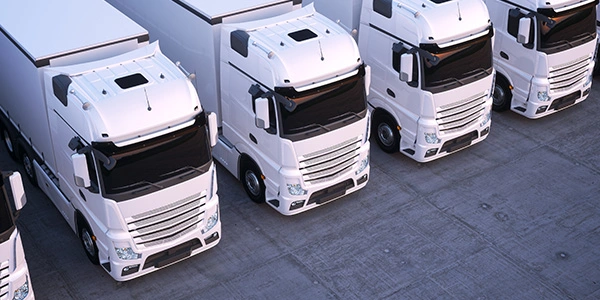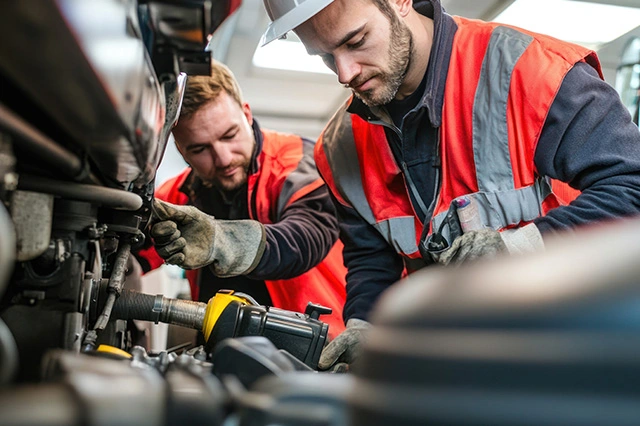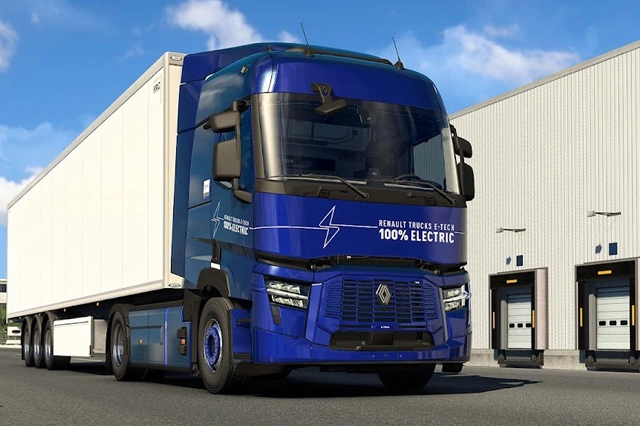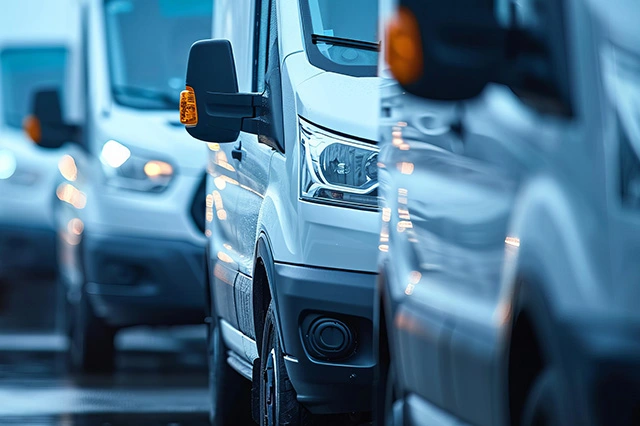HGV Fleet Insurance
Find yourself a deal when you compare insurance for all your trucks

What is HGV Fleet Insurance?
HGV fleet insurance is a type of insurance designed to cover multiple HGVs (heavy goods vehicles) that are owned or operated by a business. It provides fleet insurance cover for the vehicles and their drivers in the event of accidents, theft or other incidents that could result in financial loss.
HGV fleet policies are typically more cost-effective than insuring each HGV separately as it allows a business to insure all of its lorries under a single policy. This can simplify the insurance process as there is only one policy to manage. It can also provide a range of benefits such as reduced administrative costs and improved risk management.
What Do Policies Offer Cover For?
HGV fleet insurance coverage is designed to protect businesses that operate multiple heavy goods vehicles (HGVs) from various risks and liabilities. A comprehensive HGV fleet insurance policy typically includes coverage for:
- Accidents and damage to vehicles: This covers the cost of repairs or replacement if your HGVs are involved in an accident.
- Theft and loss of vehicles: Protects against the financial loss if any of your vehicles are stolen or lost.
- Liability for injuries or damage to third parties: Covers legal fees and compensation if your HGVs cause injury or damage to others.
- Business interruption and loss of income: Provides financial support if your business operations are disrupted due to an insured event.
- Goods in transit: Ensures the goods you are transporting are covered against damage or loss.
- Public liability: Protects your business against claims from the public for injury or property damage.
- Employers’ liability: A legal requirement that covers claims from employees for work-related injuries or illnesses.
Additionally, some policies may offer optional coverage for:
- Breakdown and recovery: Assistance and coverage for vehicle breakdowns.
- Windscreen damage: Covers the cost of repairing or replacing damaged windscreens.
- Personal effects: Protects personal belongings of drivers and passengers.
- Uninsured loss recovery: Helps recover losses from uninsured incidents.
It’s essential to carefully review the policy terms and conditions to ensure that the coverage meets the specific needs of your business.
How our process works
We’ve worked hard to refine our process and keep it as quick, easy and simple as possible for our customers.
What Type Of Vehicles Are Covered By HGV Fleet Insurance?
Truck fleet insurance is designed to cover fleets of heavy goods vehicles (HGVs) that are used for commercial purposes. The specific types of vehicles that can be covered by HGV fleet insurance may vary depending on the insurance provider and the policy in question, but in general, HGV fleet insurance can cover a wide range of vehicles, including:
- Lorries and trucks of different sizes, such as rigid lorries, artic lorries, and tipper trucks
- Trailers that are towed by HGVs, including refrigerated trailers and flatbed trailers
- Vans and other light commercial vehicles that are used for delivery or transport purposes
- Buses and coaches that are used for transporting goods or passengers
- Specialised vehicles, such as tankers, cranes, and construction vehicles
In some cases, HGV fleet insurance policies may also cover any goods or cargo that are being transported. The specific level of cover provided by HGV fleet insurance can vary depending on the needs of the business and the policy in question.
How Many HGVs Do I Need For Fleet Insurance?
The minimum number of HGVs required to qualify for HGV fleet insurance can vary between insurance providers. However, as a general rule, most providers require a minimum of three HGVs to be insured under a single policy in order to qualify for fleet insurance.
That being said, some insurance providers may be willing to provide fleet insurance for a smaller number of HGVs in combination with other insurance packages.
Some insurance providers may also offer specialised fleet insurance policies for businesses that operate combinations of HGVs, vans and other vehicles where the total number of vehicles meets policy requirements.
If you are unsure whether your business qualifies for HGV fleet insurance or if you have any other questions about HGV insurance, it is best to speak to an HGV insurance broker. They can provide you with more information about the specific requirements for fleet insurance and help you find a policy that meets the needs of your business.
HGV Fleet Insurance Requirements
HGV fleet insurance requirements vary depending on the industry, type of transport, and number of vehicles. However, there are some minimum requirements that must be met:
- Public liability insurance: This is a legal requirement for all businesses that operate HGVs, protecting against claims from the public for injury or property damage.
- Employers’ liability insurance: This is a legal requirement for all businesses that employ staff, covering claims from employees for work-related injuries or illnesses.
- Goods in transit insurance: Recommended for businesses that transport goods, ensuring the cargo is protected against damage or loss.
- Business interruption insurance: Recommended for businesses that rely on their HGVs to operate, providing financial support if operations are disrupted.
It’s also important to note that HGV fleet insurance policies may have specific requirements, such as:
- Vehicle maintenance and inspection records: Keeping detailed records can help in managing risks and potentially lower premiums.
- Driver training and qualification records: Ensuring drivers are well-trained and qualified can reduce the likelihood of accidents.
- Vehicle security measures: Implementing security features like immobilizers and GPS tracking can help protect your vehicles and reduce insurance costs.
How Much Does HGV Fleet Insurance Cost?
In general, the cost of HGV fleet insurance will be a significant expense for a business, as HGVs are large and powerful vehicles that can cause significant damage in the event of an accident. The aim of this insurance cover is to protect against any potentially devastating costs should an event like this occur.
Vehicle insurance is also a legal requirement on UK roads so fleet cover can sometimes be a more cost-effective option where a business owns and operates multiple vehicles.
By insuring a fleet of HGVs under a single policy, businesses can often benefit from reduced premiums compared to insuring each vehicle separately.
What Factors Affect The Cost Of HGV Fleet Insurance?
The cost of HGV fleet insurance can be influenced by a range of factors, including:
- Age of vehicles: Older HGVs may be more expensive to insure as they’re usually more prone to breakdowns and other issues.
- Type of vehicles: Different types of HGV may have different insurance costs depending on their size and weight.
- Drivers: The experience, age and driving history of the drivers operating the trucks can all impact premiums. Drivers with a history of accidents or driving convictions may be more expensive to insure.
- Cover level: The level of cover required can also impact insurance costs. Greater levels of insurance may be more expensive but can provide more protection in the event of an accident.
- Security measures: The security measures in place to protect HGV‘s and their cargo can also impact insurance costs. Vehicles that are fitted with security features such as immobilisers, GPS tracking and alarms may be cheaper to insure.
- Location: The location of a haulage firm can also impact insurance costs as some areas may be seen as higher-risk for accidents or theft.
- Type of business: The type of business that is operating the lorries can also impact insurance costs. For example, a business that transports hazardous materials may face higher insurance costs than a business that transports non-hazardous goods.
Brokers who specialise in insuring HGV fleets will take all of these factors into account when calculating premiums. They will also identify ways that you can potentially save money as well. Obtaining an HGV insurance quote can help you get customized coverage options tailored to your specific needs.
Reducing Truck Fleet Insurance Cost
Reducing HGV fleet insurance cost requires a combination of risk management strategies and smart insurance purchasing decisions. Here are some tips to help you save money:
- Implement a robust risk management program: Reducing accidents and claims through effective risk management can lower premiums.
- Invest in vehicle safety features: Adding cameras, alarms, and other safety features can make your fleet safer and cheaper to insure.
- Encourage safe driving practices: Promoting safe driving among your drivers can reduce the risk of accidents and claims.
- Consider increasing your excess: Opting for a higher excess can lower your premiums, but ensure it’s an amount you can afford to pay if needed.
- Shop around for quotes: Comparing quotes from different insurance providers can help you find the best deal.
- Bundle your insurance policies: Combining your HGV fleet insurance with other business insurance policies can lead to discounts.
- Take advantage of discounts: Look for discounts for no-claims bonuses, driver training programs, and other factors that can reduce your premiums.
Frequently Asked Questions
Related News
How to Get Your Fleet Ready for Summer
As temperatures rise, ensuring your fleet is prepared for summer conditions is crucial for maintaining efficiency, safety, and cost-effectiveness. The heat can take a toll on various vehicle components, making preventative maintenance essential. Here’s
Renault’s E-Tech T Tractor Unit Revolutionises the Industry
In a bold move towards sustainable transportation, Renault has unveiled its cutting-edge E-Tech T Tractor unit, a game-changer in the heavy-duty electric vehicle market. This innovative lorry is poised to revolutionize the industry with
Understanding Fleet Insurance: Named Driver vs. Any Driver Policies
Fleet insurance is an essential policy for businesses that manage multiple vehicles, ensuring that all vehicles and drivers are adequately covered under a single policy. In the UK, fleet insurance can be categorised into




